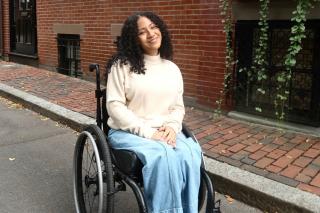“I’ve always had a passion and fire for service and helping people,” says Valeria Cardoza ’27, who is pursuing a bachelor’s in political science and a minor in public health and law and justice. “All of the work I’ve done in high school and currently at Simmons is rooted in service.”
Having grown up in a low-income family in the Boston area, Cardoza focused her college applications on local schools. Her devotion to service led her to the Bonner Community Leaders Program, which matches leaders with partner organizations in the Boston area for weekly hours of community service.
“In high school, I never imagined my heart for service would end — but at Simmons, my commitment to serving others was their commitment, too. I was drawn to their heart for service, and devotion to understanding communities like mine,” says Cardoza.
Cardoza also received the Boston Scholarship, a four-year, full-tuition scholarship that recognizes high-achieving students from Boston public high schools. But the full ride wasn’t the only thing that brought her to Simmons. Meeting Courtney Kramer, Associate Director of the London Center and Bonner Program Director, during the interview process was pivotal.
“I have learned a tremendous amount through her mentorship, which is grounded in thoughtful and intentional conversations,” says Cardoza. “I value the way she leads our program through trial and error, embracing challenges as opportunities for growth. I aspire to embody that same leadership in my own career.”
Bonner Leadership
Through the Bonner program, Cardoza attends weekly meetings. “As Bonner leaders, we engage in workshops that build valuable skills centered around leadership, professionalism, social justice, and effective communication. These meetings also focus on important topics such as accessibility, diversity, and race, helping us grow as inclusive and socially conscious community leaders,” she says. “The support I’ve received has been crucial to my growth and learning.”
Cardoza is working with the REEF Support Center (Resilience, Efficacy, and Empowerment through Foundational support services), packing food orders in support of students with food disparities. “We get food from a food bank and from local groceries and give it away for free once per month. It’s known as the Free Food Market,” says Cardoza.
Working with Matoaka Kipp ’16, Director of the REEF Support Center, has also been vital. “Every week, Matoaka and I meet to ask, ‘How do we make this work?’ Through those conversations, I’ve learned how to approach problems and find solutions — skills I now use beyond our meetings.”
As a commuter, Cardoza is eager to reach out and incorporate commuters in campus events. “I’m currently doing a project that reflects commuter experience. I want to involve commuters and intentionally show their experiences, as I understand how difficult it can be.”
First-Generation Student
When reflecting on her experience as a first-generation student, Cardoza says, “The biggest thing for me is to understand the system I’m in, and the barriers in the system based on my identities: as a wheelchair user, being Hispanic, and coming from a low-income background and a single-parent household. I have a multitude of identities that don’t really work in systems like higher education.”
In addition to the challenge of filling out financial forms, Cardoza didn’t know how to apply for accommodations through Accessibility Services. “Even once you’re here and you’ve figured out your accommodations, there is always more to figure out. It can be challenging.”
Cardoza recalls struggling in her first semester. “I had my accommodations, but what did they actually mean? I wasn’t really using them properly.” After this, she learned how and where to seek out support from others. “There are people who are going to listen. They may not understand your experience, but they will give you every resource. They are here to support and guide you.”
In addition to Kramer and Kipp, Cardoza has built a relationship with Jennifer Wong, Coordinator of Accessibility in the Office of Accessibility Services. “We meet one-on-one every week,” says Cardoza. “On weeks when a lot is going on, our meetings are especially helpful. We work together to figure out how to turn challenges into solutions.
She’s also trying to find how being a Simmons student fits into her identity — and vice versa. “I’m learning to navigate systems that I wasn’t exposed to growing up. I feel incredibly lucky to have my mom’s encouragement, as she motivates me to further my education.”
Advice for Prospective Students
Cardoza’s advice for prospective students can apply to everyone.
“Show up in every way you can,” she says. “Allow yourself to feel every part of your application experience, and your college experience. Your emotions reflect who you are, and how you show up in the world, and that matters.”
Academically, Cardoza encourages students to use the available resources. “Take advantage of office hours to talk to professors about the course material. Take the time to build relationships with people who encourage you.”
She also encourages everyone to celebrate their own efforts, regardless of the outcome. “Give yourself the flowers you deserve,” she says. “The most important thing is to embrace the challenges and even the failures, because it makes the learning and the growth more impactful on your future.”
First-Generation students can find support and resources through Simmons First to FINish.

